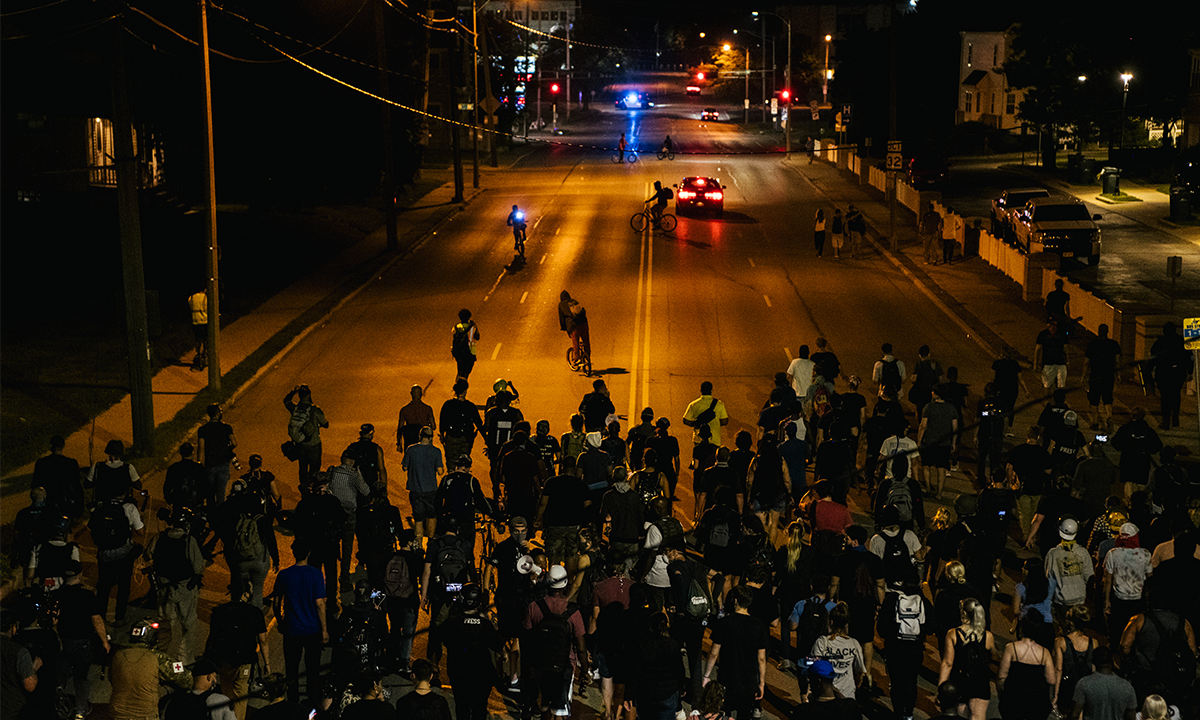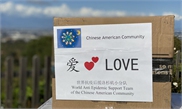
Demonstrators march on Wednesday in Kenosha, Wisconsin. The city declared a state of emergency curfew after a fourth night of civil unrest after the shooting of Jacob Blake on Sunday. Photo: AFP
Unrest in Wisconsin after a police officer shot African American Jacob Blake in Kenosha has worsened the country's racial problem, which was sparked by George Floyd's death, and its impact on the election remains unclear. Chinese analysts said that the US is moving backwards on human rights, as the situation could be even worse than in 1968.
CNN reported that the unrest has quickly turned into a political flashpoint in one of the nation's most important swing states. Republicans and Democrats also differ on the matter.
All three NBA playoff games scheduled for Wednesday US time were postponed, as players protested the shooting Sunday of Blake, the league announced. The games will be rescheduled. Doc Rivers, an African American coach of the Los Angeles Clippers, said, "It's amazing why we keep loving this country, and this country does not love us back. It's really so sad."
Three months after violent nationwide unrests followed Floyd's death in May, Blake's family called for peaceful protests and the arrest of the policemen on Wednesday. But analysts said no one can guarantee there will be no violence during the protests, and Blake won't be the last African American killed by the police.
US President Donald Trump and the Republicans are using the party's national convention to shine a spotlight on violence and property damage caused by some of the protests over racial injustice and police brutality this summer - as fires raged in Kenosha, CNN reported.
The Republicans' message in Wisconsin and at the convention has been to issue calls for "law and order," a term that Richard Nixon used to blame Democrats for being too soft on rioters in a similar situation in 1968. The Republicans have also pledged a crackdown on looting, violence and property damage. The GOP has broadly insisted there is no systemic racism in policing, the report said.
Democratic presidential candidate Joe Biden decided to stand with the protesters, and called for in a statement on Monday "an immediate, full and transparent investigation, and that the officers must be held accountable," CNBC reported.
Chinese experts on US studies said the human rights problems in the US deserve global attention and discussion in an international framework. They said the unrests will become an "x-factor" in the 2020 election.
In the 1968 election, Republican candidate Nixon used the public's fear toward riots in Washington D.C. and Baltimore caused by the assassination of African American civil rights leader Martin Luther King, Jr. to win the election. Analysts said if the current unrests get out of control and seriously threaten public security, more voters could turn to Trump, and call for tough law enforcement.
New wounds, old wounds
For most of people who never lived in the 1960s, the answer to a question like "Is 2020 in the US worse than 1968?" might be "Yes," at least in terms of deaths. Over 180,000 Americans have died from COVID-19 so far, over three times the American deaths in the Vietnam War.
In contrast to the assassinations of Robert F. Kennedy and Martin Luther King that fueled protests and violence in over 100 US cities in 1968, experts believe that the fruits of America's pre-civil rights and racial movements have already disappeared.
In February 1968, three African-American students were killed and 28 were wounded by police in Orangeburg, California after a desegregation protest.
The racial problem lingers on in the US, accompanied by violent law enforcement, gun problems and hate crimes which have intensified, Diao Daming, a US politics expert and an associate professor at the Renmin University of China, told the Global Times on Thursday.
As the white population decreases in the US and becomes a source of anxiety, the sense of fear and hatred toward minorities grows. The proportion of white people among blue-collar workers is also shrinking, and they vent their emotions through white supremacism, Diao said.
However, the US in the 1960s saw the Civil Rights Act of 1964 that outlaws race and color discrimination and prohibits segregation, as well as the Voting Rights Act of 1965 that bans racial discrimination in voting.
These laws were pushed by Democrats and moderate Republicans. Analysts noted the protests and riots in the US show the great dissatisfaction with the reality, and also disillusionment with the past civil rights movement's efforts, as racial segregation continues.
US hypocrisy on human rights
Li Haidong, a professor at the China Foreign Affairs University, said that on the international level, more and more countries have realized that the US, which considers itself a "champion of human rights" to interfere in other countries' domestic affairs and invades others using "human rights" as an excuse, has a terrible human rights record.
He believes that many countries will raise this issue to expose the US' hypocrisy.
Zhu Liyu, deputy director of the Center for Human Rights Studies at the Renmin University of China, told the Global Times on Thursday that human rights problems are disastrous in the US. After the US withdrew from the UN Human Rights Council in 2018, it has become more difficult for the international community to condemn and supervise the world's largest economy.
In July, 54 African countries called on the United Nations Human Rights Council to discuss the serious violation of human rights after Floyd's death. Over 600 NGOs urged the council to deal with the systematic racism and police impunity in the US, according to media reports.
The State Council Information Office of China in March released the 2019 Report on Human Rights Abuses in the US, saying the US is the most gun-violent country in the world, with 415 mass shootings in 2019, and 39,052 gun-related deaths.
The report also said that African-American adults in the US are 5.9 times more likely to be jailed than white adults, the unemployment rate of African-American workers twice that of whites, and the average wealth of white households almost 10 times that of African-American households.



